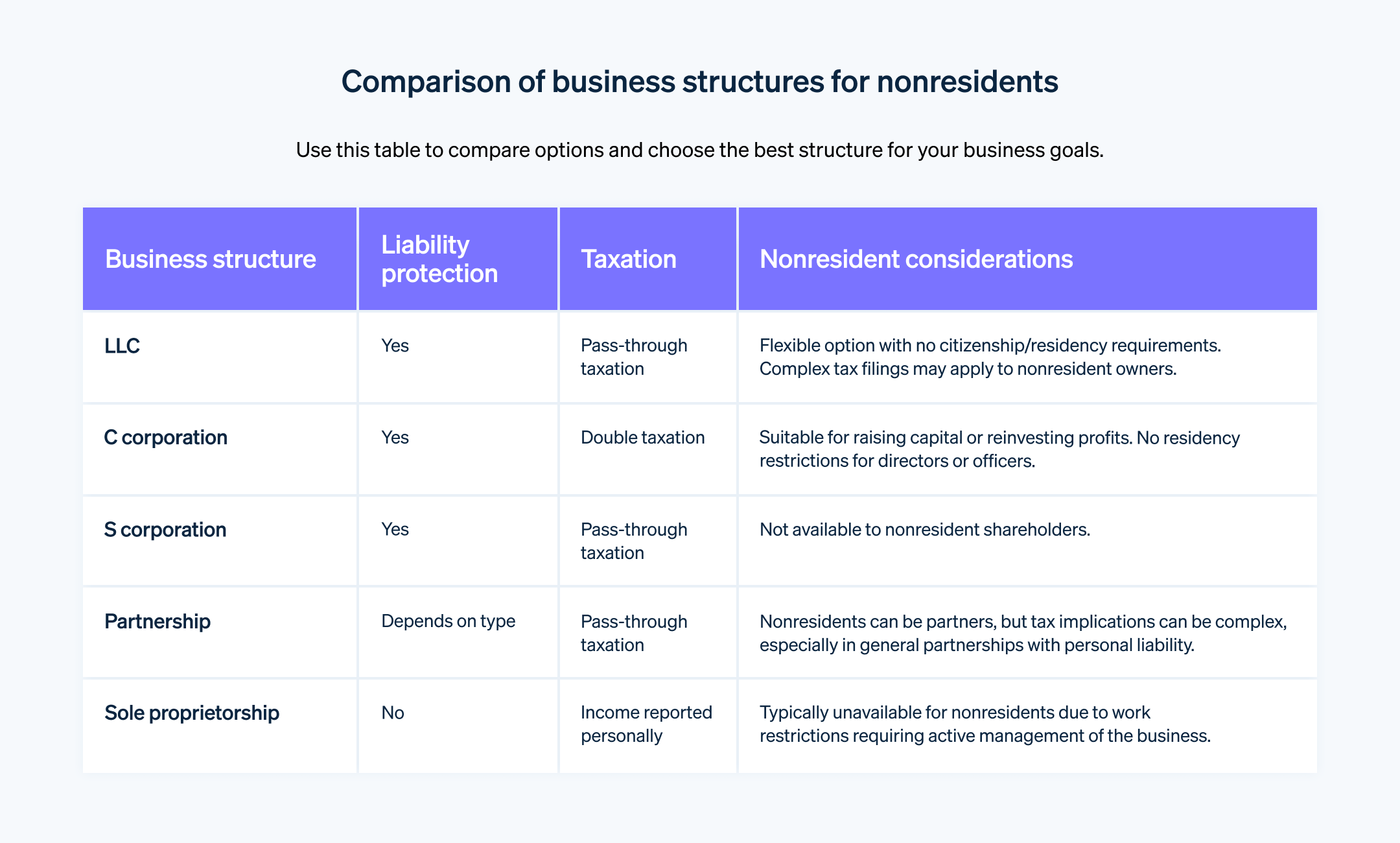2023 年,美国提交的550 万份新企业申请创下了历史新高,而这种创业增长既能惠及非居民,也能惠及美国人。非美国居民或公民可按照本指南中概述的流程在美国成立公司或有限责任公司 (LLC) 等正式商业实体。这一过程的具体细节因企业注册所在州而异,企业必须遵守所有联邦和州法规,包括纳税义务和适当的商业文件。以非居民身份注册企业涉及额外的复杂性,但这是一个可以实现的目标。
下面,我们将介绍作为非居民注册美国企业的步骤,包括决定正确的公司结构以及处理移民和签证要求。
目录
- 选择正确的业务结构
- 选择企业注册州
- 注册和合规流程
- 建立金融基础设施
- 遵守法律和法规
- 移民和签证注意事项
选择正确的业务结构
选择适当的业务结构是创建任何业务的第一步,无论您的居留身份如何。您的选择将影响您的税收、文书工作要求、个人责任和筹集资金的能力。在考虑不同的企业结构时,非居民应考虑个人资产保护、纳税义务、记录要求和合规标准的重要性。其他有助于确定正确结构的因素包括您是否需要筹集资金以及您对企业的长期目标。
下面概述了美国的主要公司结构,以及非居民的主要注意事项。
有限责任公司 (LLC)
有限责任公司(LLC) 提供个人责任保护,这意味着在出现商业债务或诉讼时,个人资产通常会受到保护。与公司相比,有限责任公司的报告要求较少。
税收:通常情况下,有限责任公司是一种“直通式”纳税实体,这意味着企业无需纳税,但利润和亏损会转入所有者的个人纳税申报单。不过,非居民面临着复杂的税务问题,可能需要提交特定表格或选择对有限责任公司进行不同的税务处理。
非居民考虑:有限责任公司的灵活性和保护使其成为非居民的热门选择。不要求会员必须是美国公民或居民。
C 类公司
A C 类公司 是一个独立于其所有者的法律实体,提供最高级别的个人责任保护。它可以通过发行股票来筹集资金,并需要设立董事会和定期召开会议。
税收:C 类公司需缴纳企业所得税。以股息形式分配的利润在股东层面再次征税,导致双重征税。不过,对于非居民来说,如果他们不拿红利,而是将利润再投资于企业,这个问题可能会小一些。
非居民考虑:非居民也可以拥有 C 公司,而且对董事或高级职员没有居住要求。如果您打算将利润再投资或寻求风险资本,这是一个不错的选择。
S 类公司
S 类公司与有限责任公司一样是一种直通实体,其结构要求与C 类公司相似。
税收:收入转入股东的个人纳税申报表。它不受双重征税的限制。
非居民考虑:非居民不能成为 S 类公司的股东,因此此选项通常不适用于非居民企业主。
合作伙伴
在合伙企业中,两个或两个以上的人共享所有权。合伙企业有几种类型,包括普通合伙企业 (GP) 和有限合伙企业 (LP)。
税收:这是一个直通实体,利润和亏损都流向合伙人的个人报税表。
非居民考虑:虽然非居民也可以成为合伙人,但税务影响可能很复杂,尤其是在普通合伙企业中,合伙人对企业债务负有个人责任。
独资企业
这是最简单的企业形式,由一个人拥有和经营,没有所有者和企业之分。
税收:收入在所有者的个人报税表中申报。
非居民考虑:通常情况下,非居民不能在美国建立独资企业,因为这需要企业主在企业中工作,这与签证和工作许可规定相冲突。

选择企业注册州
选择在哪里注册您的公司是另一个关键步骤。各州的法律、税收和企业要求差异很大。以下是非居民在选择企业注册州时应考虑的因素:
税收:一些州,如怀俄明州、内华达州和南达科他州,以其优惠的税收政策而闻名,其中包括较低的商业税或无州所得税。
法律制度:考虑一下该州的法律制度对企业有多友好。例如,特拉华州就以商业友好和完善的公司法而闻名。
申请费:首次申报费和年度报告费因州而异。
特许经营税:有些州对企业征收特许经营税,这可能是一个重要的考虑因素,具体取决于企业的规模和收益。
实际存在或联系:无论您的企业在哪个州注册,在任何州有实体存在都会产生关联税义务。如果您的企业需要在美国设立实体机构或计划在美国雇佣员工,请考虑在不同州开展这些业务的物流和成本。
隐私:有些州对企业主的隐私保护比其他州更多。例如,怀俄明州和内华达州不要求披露股东或董事信息。
市场准入:如果您的企业以特定的地理市场为目标,请考虑在该地区或附近注册,以获得更好的访问和联网机会。
专业支持:能否获得法律和会计等专业服务,特别是那些熟悉国际企业主的服务,可能是一个重要因素。
热门注册州
特拉华州:特拉华州以其商业友好型法律而闻名,是国内外企业的热门选择。特拉华州大法官法庭专门处理商业法,为公司诉讼提供清晰度和可预见性。
内华达州和怀俄明州:这些州的吸引力在于其优惠的税收政策和隐私保护方面的考虑。
加利福尼亚州和纽约州:虽然这些州的税收不是最优惠的,但由于其市场广阔、商业网络便捷,特别是如果您的业务活动集中在这些州,它们可能是一个不错的选择。
注册和合规流程
对于非居民而言,在美国注册公司涉及多个步骤,以遵守法律法规。以下是该过程的概述。
选择注册代理
美国的企业必须有注册代理人。该代理人代表您的企业接收法律文件和政府信函,必须在企业注册所在州有一个实际地址。
注册您的企业实体
根据企业结构的不同,您需要向州企业备案办公室提交不同的文件来注册您的企业。这些文件包括公司的注册章程或有限责任公司的组织章程。
获取雇主识别号 (EIN)
雇主识别号 (EIN) 是纳税、雇佣员工和开设商业银行账户所必需的。非居民可通过填写 IRS SS-4 表格获得 EIN,可能需要致电国税局完成此过程。
营业执照和许可证
根据企业类型和经营地点的不同,您可能需要获得特定的执照和许可证才能在美国合法经营。
年度报告和特许经营税
大多数州都要求企业提交年度报告并缴纳特许经营税。各州和企业结构的要求各不相同。
联邦纳税义务
非居民企业主必须遵守美国联邦税法。您的纳税义务由您在美国的商业活动性质决定,也可能受到您的母国与美国之间税收协定的影响。
州纳税义务
根据企业注册所在州和企业性质,您可能需要缴纳州所得税、销售税以及其他州特定的税种。如果您的企业在某个州有大量业务,即使您没有在该州注册,也可能需要缴纳州税。实质性存在的定义因州而异。
银行和金融交易
开设美国商业银行账户对非居民来说可能具有挑战性,因为许多账户要求在当地有实体机构。有些银行可能允许您远程开户,但这通常需要额外的文件和验证。考虑适用于贵公司业务的银行和金融法规,包括外国账户税收遵从法案 (FATCA)和反洗钱 (AML) 法。
建立金融基础设施
为总部设在美国的企业建立财务基础设施涉及几个关键组成部分,以确保顺利开展财务业务并遵守美国法规。
开立美国商业银行账户
要开立商业账户,您通常需要护照、商业注册证明(如公司章程或组织机构)、EIN,有时还需要美国地址。某些银行可能需要其他文件。在选择银行时,要找一家有与国际客户打交道经验的银行,如果你不能前往美国,它可以为你提供远程账户设置支持。
会计和簿记
良好的记录保存对于税务合规和财务管理非常重要。使用会计软件管理财务、跟踪收入和支出,并为报税季节做准备。QuickBooks、Xero 或 FreshBooks 等选择在中很受欢迎小企业。认真记录所有财务交易,包括发票、收据和银行对账单。
纳税义务
您需要为美国企业赚取的收入缴纳联邦税。具体义务取决于您的企业结构和运营情况。确保您了解州和地方的税收要求,其中包括所得税、销售税以及其他基于您的业务地点和活动的适用税收。美国与您本国/地区之间的税务条约也可能影响您的纳税义务。考虑咨询具有国际商务专业知识的税务专业人士。
支付处理服务
选择支付处理器时,考虑处理商的费用、与网站或销售平台整合的难易程度以及处理国际交易的能力。例如,通过 Stripe,企业可以处理在线和现场交易。Stripe 对于非居民来说是一个明智的选择,因为它可以让企业接受来自全球客户的付款,而且不要求企业获得自己的商家账户。
财务规划与管理
制定预算,列出预期收入和支出,以保持企业财务健康。定期查看财务报表,以评估企业的财务业绩并做出明智的决策。考虑预留资金,以应对意外支出或现金流波动。
合规与报告
您的金融行为受美国法律法规的约束,包括反洗钱法和 FATCA。您可能需要向美国当局报告某些金融活动,尤其是当您跨境转移大笔资金时。
保持法律和法规遵从性
在美国经营的所有企业都必须遵守联邦、州和地方各级的法律法规。这包括纳税义务、劳动法以及有关企业责任、环境保护和知识产权的标准。定期审查业务运营是否符合所有相关要求是个好主意:这可以包括自我审计或聘请顾问。美国企业的法律和监管义务概述如下。
联邦合规
税务合规:随时了解联邦税收义务,包括所得税和就业税。提交年度报税表,必要时缴纳预估税款。
遵守证券交易委员会 (SEC) 的规定:如果您的业务涉及证券交易或发行,您将受到美国证券交易委员会法规的约束。
行业特定法规:根据您的业务领域,您可能需要遵守特定行业的联邦法规(例如,有关医疗保健、金融或食品和饮料行业的法规)。如果您的业务涉及制造或处理危险材料,则需要遵守环境保护署 (EPA) 的标准。
州和地方合规性
年度报告:大多数州要求企业提交年度报告并支付申报费。这些报告使您的业务信息与州保持同步。
州税:遵守州所得税、销售税和工资税要求。这可能包括季度或年度申报和付款。
执照和许可证:更新任何州或地方的执照和许可证,以确保您的企业获得合法经营的授权。
州特定法规:了解可能影响您的业务的任何州特定法律,如消费者保护法、就业法和环境法规。
企业合规
公司治理:保持适当的公司治理做法,其中可能包括举行年度会议、保存会议记录以及遵守企业章程或经营协议。
记录保存:详细记录所有业务活动、财务交易、合规工作以及企业领导层做出的决策。
美国劳动法合规
劳动法:如果您在美国有员工,请遵守有关工资、工作条件、不歧视和福利的联邦和州劳动法。
员工移民合规:确保任何外籍工人都持有适当的签证和工作许可证。
知识产权合规
- IP 注册:在美国注册商标、版权和专利,保护您的知识产权。定期监测和实施知识产权,防止侵权。
数据隐私和安全合规
数据保护:遵守美国数据保护法律,例如加州消费者隐私法案 (CCPA)和健康保险流通与责任法案 (HIPAA),具体取决于您的业务类型和位置。
网络安全:实施强有力的网络安全措施,保护业务和客户数据。
移民和签证注意事项
非居民如果想积极管理或工作在美国的企业,必须通过美国移民系统办理手续。以下是与移民和签证有关的一些重要注意事项:
签证申请流程:申请程序可能很复杂,而且因签证类型而异。这通常涉及提交申请、参加美国大使馆或领事馆的面谈,以及提供有关您的业务和投资的大量文件。
税务影响:签证持有者须遵守美国税法,根据其在美国逗留的时间,可能被视为税务居民。了解您作为签证持有人的纳税义务,以避免法律问题。
保持签证状态:不同的签证类别允许不同的活动。违反签证条款可能会导致失去身份或被驱逐出境。
获得永久居留权的途径:有些签证,如 EB-5 签证,提供了直接获得永久居留权的途径。其他签证,包括 E-2 签证,不会自动获得绿卡,但可以通过其他途径,如改变身份或雇主担保,提供潜在的途径。
家属:考虑您的家属(即配偶和子女)的签证选择。有些签证允许家属陪同您前往美国,在某些情况下,您的配偶可能会获得工作许可。
签证和绿卡的类型
B-1 临时商务访客签证:B-1 签证主要适用于参加会议或谈判合同的商务访客。它不允许在美国积极经营业务或就业,但适合与您的业务有关的短期访问。
E-2 条约投资者签证:E-2 签证允许个人在美国为其投入大量资金的企业工作。没有规定最低投资额,但相对于购买或建立企业的总成本而言,投资额应相当可观。这种签证适用于与美国签订商业和航海条约的州的个人。
L-1 公司内部调动签证:L-1 签证允许将经理、行政人员或具有专业知识的员工调往在美国和国外运营的企业的美国分支机构。L-1A 签证专门针对行政人员和管理人员,而L-1B 签字则针对具有专业知识的雇员。
EB-5 投资者签证:EB-5 签证允许投资者在新的商业企业中投资 180 万美元(或在目标就业区投资 90 万美元),为美国工人创造至少 10 个全职工作岗位,从而成为永久居民。
Stripe Atlas 如何提供帮助
Stripe Atlas 可为贵公司搭建法律架构,助力在两个工作日内从全球任何地点完成融资、开设银行账户及接收付款。
已有超 7.5 万家公司通过 Atlas 完成注册,其中包括获 Y Combinator、a16z 与 General Catalyst 等顶级投资机构支持的初创公司。
申请使用 Atlas 注册公司
通过 Atlas 申请注册公司仅需不到 10 分钟。您可自主选择公司架构,即时核验公司名称是否可用,并可添加最多四位联合创始人。您还需确定股权分配方案,预留一定比例的股权供未来投资者与员工认购,指定公司管理人员,并通过电子签名完成所有文件签署。所有联合创始人也将收到邮件邀请,通过电子签名签署其对应文件。
在获取雇主识别号 (EIN) 前开通收款和银行服务
完成公司注册后,Atlas 会为您申请雇主识别号码 (EIN)。持有美国社会保障号、美国地址及手机号码的创始人可享受美国国税局 (IRS) 的加急处理服务,其他创始人则需通过标准流程申请,耗时可能稍长。此外,Atlas 支持在 EIN 下发前进行收款与银行开户操作,让您在 EIN 获批前即可开始收款并完成交易。
无现金创始人股权认购
创始人可使用知识产权(如版权或专利)而非现金认购初始股份,相关认购凭证将存储在 Atlas 管理平台中。使用该功能需满足知识产权估值不超过 100 美元的条件;若您持有的知识产权价值高于此限额,请在操作前咨询专业律师。
自动提交 83(b) 税务申报
创始人可通过提交 83(b) 税务申报降低个人所得税负。无论您是美国籍或非美国籍创始人,Atlas 均可代为完成申报流程——采用 USPS 认证邮件寄送并附带物流追踪服务。您可直接在 Stripe 管理平台获取已签收的 83(b) 申报表及官方寄送凭证。
全球顶尖水准的公司法律文件
Atlas 为您提供创办公司所需的全部法律文件。Atlas 的 C 类公司文件由全球顶尖风投律所美国科律律师事务所 Cooley 联合设计,旨在助您立即启动融资,并确保公司获得全方位法律保护,涵盖股权架构、权益分配及税务合规等核心领域。
Stripe Payments 服务首年免费,更享价值 5 万美元的合作伙伴专属优惠与折扣
Atlas 与顶级合作伙伴深度联动,为创始人提供独家优惠与资源支持,涵盖 AWS、Carta、Perplexity 等行业领军企业的工程开发、税务合规、财务管理及运营必备工具折扣,更免费赠送首年特拉华州法定注册代理服务。作为 Atlas 用户,您还将解锁 Stripe 专属权益——最高 10 万美元交易额的全年免费支付处理服务。
了解关于 Atlas 如何助您快速轻松地创立新企业的更多信息,或立即开始使用。
本文中的内容仅供一般信息和教育目的,不应被解释为法律或税务建议。Stripe 不保证或担保文章中信息的准确性、完整性、充分性或时效性。您应该寻求在您的司法管辖区获得执业许可的合格律师或会计师的建议,以就您的特定情况提供建议。